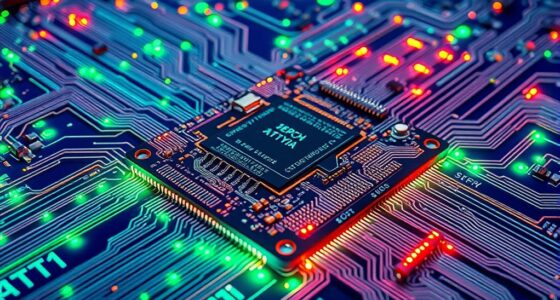Autonomous AI agents are transforming code generation by helping you write, troubleshoot, and optimize software more efficiently. They work seamlessly alongside you, reducing manual effort and accelerating project timelines. While they enhance productivity, it’s vital to maintain transparency, ethical standards, and human oversight to avoid biases and errors. Staying aware of these factors helps you leverage AI responsibly. Keep exploring, and you’ll uncover more ways to integrate these powerful tools effectively into your workflow.
Key Takeaways
- Autonomous AI agents can generate, troubleshoot, and optimize code, significantly accelerating software development workflows.
- Transparency and human oversight are essential to ensure ethical use and prevent biases in AI-generated code.
- Clear accountability frameworks are needed to address responsibilities and legal implications of AI-produced software.
- Integrating AI requires balancing automation with ongoing developer skills and continuous learning to avoid skill erosion.
- Effective collaboration frameworks maximize AI-human synergy while maintaining ethical standards and trust in the development process.

As artificial intelligence continues to advance, autonomous AI agents are emerging as powerful tools for code generation. These agents can work alongside developers, enabling truly collaborative development environments where human expertise and machine efficiency complement each other. Instead of manually writing every line, you can rely on autonomous AI to generate code snippets, troubleshoot issues, and even suggest improvements, streamlining your workflow and accelerating project timelines. This collaborative approach not only boosts productivity but also reduces the risk of human error, making development more reliable and efficient. However, integrating autonomous AI into your coding process raises important ethical considerations. You need to guarantee transparency in how the AI makes decisions and generates code, especially when the resulting software affects users or sensitive data. Relying on AI without understanding its decision-making process can lead to unintended biases, vulnerabilities, or compliance issues. As you incorporate these agents, it becomes essential to establish clear guidelines on their use, monitor their outputs for accuracy, and verify that generated code aligns with ethical standards. Trusting autonomous AI doesn’t mean relinquishing oversight; instead, it demands a balanced approach where human judgment remains central. Additionally, you should consider the implications for intellectual property and accountability. If an AI produces problematic code that causes harm or breaches regulations, questions around responsibility arise. To navigate this, you must develop policies that clearly define the AI’s role and your team’s accountability, ensuring ethical integrity throughout development. Moreover, it’s critical to address the potential for dependence on AI, which could diminish developers’ skills over time. Promoting continuous learning and understanding of AI-generated code helps maintain your technical expertise and prevents complacency. As you explore autonomous AI agents, remember that their success hinges on well-designed collaboration frameworks and ethical safeguards. They are not meant to replace human creativity or judgment but to augment your capabilities. By establishing transparent processes, adhering to ethical standards, and actively monitoring AI outputs, you can harness their full potential responsibly. Ultimately, integrating autonomous AI into your development process offers immense benefits, but doing so requires careful consideration of the collaborative and ethical dimensions involved. This approach ensures you leverage the power of AI while upholding integrity, accountability, and trust—cornerstones of effective and ethical software development.
Frequently Asked Questions
How Do Autonomous AI Agents Adapt to New Programming Languages?
You might wonder how autonomous AI agents adapt to new programming languages. They leverage language adaptability by analyzing syntax, patterns, and documentation of the new language. This helps them overcome learning curves efficiently. As they process more examples, they refine their understanding, enabling smoother adaptation. Your AI agent becomes more proficient over time, quickly handling various languages, and reducing the effort needed for updates or new projects.
What Are the Ethical Considerations of Autonomous Code Generation?
Imagine a mirror reflecting your actions—autonomous code generation raises ethical questions like bias concerns and accountability issues. You must consider how these AI systems might unintentionally embed prejudices or make decisions without oversight. As you develop or deploy such agents, you’re responsible for ensuring transparency and fairness. By addressing these concerns, you help create a future where AI acts ethically, respecting human values and accountability.
Can These Agents Replace Human Developers Entirely?
You wonder if autonomous AI agents can replace human developers entirely. While AI creativity can handle routine coding tasks, it still lacks the nuanced understanding and problem-solving skills humans bring. These agents can enhance developer collaboration, making workflows more efficient. However, complete replacement isn’t likely soon, as human insight remains essential for complex, innovative projects. Instead, AI acts as a powerful tool that complements and supports your development efforts.
How Do AI Agents Handle Debugging and Error Correction?
Imagine AI agents as skilled blacksmiths, honing their craft through machine learning. When debugging and error correction, they analyze code patterns, identify flaws, and refine scripts much like sharpening a blade. They continuously learn from mistakes, enhancing code optimization. While they handle errors efficiently, they still rely on human oversight for complex issues, acting as diligent apprentices supporting developers, rather than replacing them entirely.
What Are the Limitations of Current Autonomous AI in Complex Projects?
You’ll find that current autonomous AI faces limitations in complex projects due to algorithmic biases that can skew results and reduce accuracy. Scalability challenges also hinder performance as project complexity grows, making it hard for AI to adapt seamlessly. These issues mean you might need to intervene more often, limiting the full potential of autonomous AI in handling intricate tasks without human oversight or improvements in algorithms.
Conclusion
As you explore autonomous AI agents for code generation, it’s clear they’re opening new doors and pushing boundaries. These agents can act independently, boosting efficiency and creativity in ways you hadn’t imagined. But remember, every tool has its limits — don’t put all your eggs in one basket. Stay curious and keep experimenting, because in this rapidly evolving field, the sky’s the limit. Embrace the challenge, and you’ll find the treasure at the end of the rainbow.









